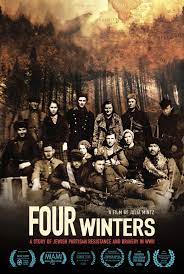
FOUR WINTERS:
A Story of Jewish Partisan resistance and Bravery in WW2.
US, 2022, 98 minutes, Colour.
Directed by Julia Mintz.
This documentary narrates episodes during World War II, 80 years after the events. It is a continuing reminder, lest we forget, of the disaster that was the Holocaust, the Jews in the concentration camps and the executions, and a reminder of the many Jews who were rounded up in towns, for instance in the Polish countryside, massacred and tossed into a mass grave. This film has documentary footage of this kind of massacre.
The film is narrated by seven survivors of partisan activity during the war, the interviews taking place in the United States, the introduction to the characters makes them seem very much of the grandparent generation but, as they continue with their narration, they come to vivid life, memories, sadness at the death of family, their own survival, becoming partisans, the activity of the partisans in the forests of northern Poland, a crusade against the Nazis.
While, in general, the information is familiar, we can appreciate the detail in which it is presented, not only from the witnesses themselves and their memories, but a great range of photographs and documentary footage of the period, one of the partisans mentioning how she had a camera to record the events.
The basic structure of the film is close-ups of the witnesses and their conversation with all kinds of documentary material inserted to bring their comments vividly to life – and, sadly, so much of death. It is a record of the Nazi invasions of towns in eastern Poland in 1941, the consequences for the concentration camps, so many of the survivors going into the forests and becoming part of the partisan groups, their interactions with the German military and police presence, with locals who joined to help the partisans or their collaborators with the Nazis.
Of the witnesses, Michael Stoll and Isadore Farbstein are expert storytellers without intending to be, the camera photographing them in close-up, Isadore looking down to the camera, Michael looking across. There is also a third man interviewed who has some stories. Of the four women, Luba Abramowitz and Gertrude Boyarski, looking very grandmotherly at first, begin to tell their stories, are very strong, intense and persuasive, in their storytelling and the repercussions on what it was like for them as young women to be part of the partisan war. Two other women witnesses speak, again intensely, but it lesser contribution than the other two women.
This is the kind of film that a wide audience can watch, to be reminded and/or to be informed – and a film which should be watched by younger generations, lest we forget.